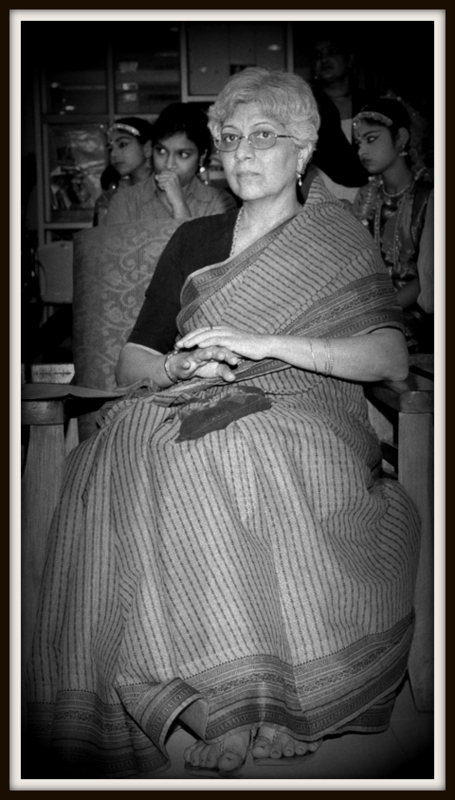Remembering IAS Officer Anita Kaul, Who Reformed Our Education System with the RTE Act
A 1979 batch IAS officer of the Karnataka cadre, Anita Kaul's infectious passion for public service was matched only by her sense of pragmatism. Here's a heartfelt tribute to one of India's finest bureaucrats

Education doesn’t just lead to individual freedom and empowerment, it also lays the foundation of a country’s social prosperity and economic development. This makes a sound school education system the minimum India should strive to provide to its population. It was with this intention that the Government launched the Right to Free and Compulsory Education (RTE) Act in 2009 and its principle architect was a civil servant who deeply wanted to make a positive difference to the country’s education system.
A 1979 batch IAS officer of the Karnataka cadre, Anita Kaul’s infectious passion for public service was matched only by her sense of pragmatism.
After a sterling 35 years old career, retired IAS officer Anita Kaul, aged 62, passed away earlier this month. Here is a tribute to the hardworking lady who played a key role in reforming India’s elementary education system.

Photo Source
After an MA in Linguistics from Jawaharlal Nehru University (JNU), Delhi, and a degree in German from Fergusson College, Pune, Kaul successfully cleared the Union Public Service Commission Examination in 1979. She served as the Deputy Commissioner of Karnataka’s Chickmagalur, Gulbarga and Shimoga districts for a few years before being posted to Delhi on a central government deputation.
Her stellar work as the deputy secretary in the Department of Culture, and later in the Department of Education, earned her much appreciation. It also ensured that she was soon promoted to the rank of an union secretary in the Ministry of Human Resource Development (HRD).
It was during her tenure in the HRD ministry that Kaul played a pivotal role in the introduction and implementation of the RTE Act. This Act made the provision of education to all children in the age group 6 –14 years in the country a fundamental right.

Photo Source
One of India’s finest bureaucrats, Anita Kaul preferred working in the social sector, especially in the fields of education, health, nutrition, and women empowerment. Hard-working, empathetic, committed and stubbornly honest, she was known for her people-centric initiatives, evidence-based policy-making and rigorous programme evaluations. While her administrative brilliance fetched her widespread respect in the official circles, it was her instinctive thoughtfulness that endeared her deeply to the common man.
Apart from being the driving force behind the RTE Act, Kaul also introduced several other schemes that made a substantial contribution towards the improvement of the quality and quantity of education in the country. She played an important part in bringing Nali Kali (an initiative that enabled children to learn at their own pace and without the fear of failure) into Karnataka’s primary schools.
Developed in 1995 as part of a small UNICEF-assisted pilot project in Karnataka’s Mysore district, the Nali Kali initiative used creative learning practices to help retain children in school as well as bring in those not attending school. The name, Nali Kali, literally means ‘play and learn’ and this initiative supported exactly that.

Photo Source
Under Nali Kali, the learning process was organised into milestones, providing every child the opportunity to assess his or her own progress. The initiative also highlighted the importance of encouraging and empowering teachers to initiate changes from within.
A keen observer of all developments taking place in education sector, Anita Kaul quickly realised the many advantages of the Nali Kali scheme.Knowing that the ‘one-size-fits-all’ yardstick used to assess the abilities of all children in India’s education system did not recognize that each child is unique, the insightful lady believed that the Nali Kali‘s system of activity-based learning could help change this.
Also Read: Meet Pratyaya Amrit, the Inspiring IAS Officer Who Has Placed Bihar Firmly on the Road to Success
Under Kaul’s guidance, the Nali Kali methodology was introduced in nearly 14000 Karnataka schools in 2008. The next year, it was introduced in all government Kannada medium schools at the primary level. A Nali Kali curriculum in Urdu was also developed and introduced on a pilot basis in all government Urdu medium schools in 22 blocks of Karnataka. The initiative was very effective; it significantly improved enrollment in government school, particularly of girls.
Another initiative close to Anita Kaul’s heart was Mahila Samakhya, a women empowerment programme in Karnataka that she had launched way back in 1989. The guiding principle of this programme is that education makes women aware, empowered, capable and self-reliant.

Photo Source
Kaul knew that education did not mean merely imparting literacy, but also building awareness and skills in women that would bring about a change in their lives and society. So, keeping in mind the prevailing realities of gender imbalance, Kaul ensured that the first step of Mahila Samakhya programme in Karnataka addressed and dealt with the problems that inhibited women’s education – lack of self confidence, geographical isolation, oppressive social customs, and the struggle for survival.
She also helped set up alternative centres, residential camps and early childhood development centres that targeted out-of-school girls, especially those from socially and economically marginalized communities. Her practical measures back then has ensured that the good work she started years ago is still being carried forward successfully in the state.
Generally, in India, new initiatives usually take a long time to show their results on the ground. This is the reason why civil servants rarely see the results of schemes they have initiated within their tenure. However, Anita Kaul was one of the few Indian civil servants who had the satisfaction of seeing her work make a tangible difference to the society.
You May Like: How a Young IAS Officer Used Education to Transform the Naxal-Affected District of Dantewada
Even after her retirement in 2015, Anita Kaul continued to work actively with the civil society. After retiring as Secretary (Justice) in the Government of India, she became the director of the Council for Social Development in Delhi, a research organization set up in 1962 by Durgabai Deshmukh. She was also a life member of the Foundation of Education and Development (an organization that works for the integrated education of adolescents) in Jaipur. She also worked for the education and rehabilitation of homeless and street children as a member of the Hyderabad-based Rainbow Foundation.
Despite her many contributions in the social sector, Anita Kaul wore her achievements lightly. Always warm, courteous and humble, Anita and her husband Sanjay Kaul (also formerly in the IAS) were very generous about sharing their experiences, ideas and feedback with others.
Kathyayini Chamaraj, executive trustee of Citizens’ Voluntary Initiative for the City of Bangalore (CIVIC), met Anita Kaul for the first time during a discussion on the State Plan of Action for Children in the 1990s.
Recalling her first meeting with Kaul, Chamaraj told Times of India,
“When I saw her for the first time, I was struck by her humility . Not a single piece of jewellery on her. I wondered how anyone could be so grounded and passionate about her work.”
People like Anita Kaul come along very rarely. Civil servants like her are rarer. One of those rare government officers who combined a innovative mind with the ability to push new ideas through a slow-moving system, Anita Kaul will be greatly missed by the country she served.
Centre for Budget and Policy Studies (CBPS) will be organising a memorial meeting for Anita Kaul on 26 October 2016 at the Indian Institute of World Culture, Basavangudi in Bengaluru. For more details, please contact [email protected].
Feature Image
Like this story? Have something to share? Email: contact@thebetterindia.
NEW! Log into www.gettbi.com to get positive news on Whatsapp.

Similar Story

‘I Started With 5 Kids, Now I Teach 105’: Delhi Constable’s Free School Helps Kids Dream Big
Doing odd jobs around Delhi, these kids were deprived of education and opportunities. When constable Than Singh saw their plight, he jumped to action and started teaching them for free. Here’s their story.
Read more >
If you found our stories insightful, informative, or even just enjoyable, we invite you to consider making a voluntary payment to support the work we do at The Better India. Your contribution helps us continue producing quality content that educates, inspires, and drives positive change.
Choose one of the payment options below for your contribution-
By paying for the stories you value, you directly contribute to sustaining our efforts focused on making a difference in the world. Together, let’s ensure that impactful stories continue to be told and shared, enriching lives and communities alike.
Thank you for your support. Here are some frequently asked questions you might find helpful to know why you are contributing?


This story made me
-
97
-
121
-
89
-
167












